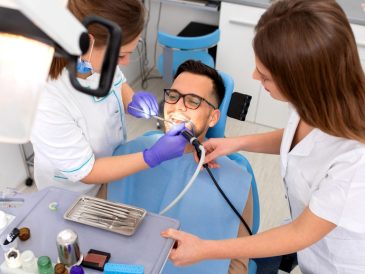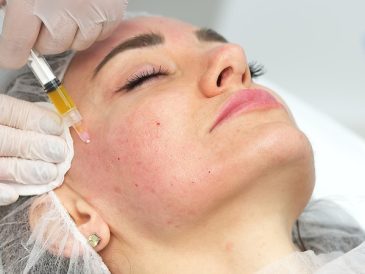Oral cancer is a potentially life-threatening disease that often begins with subtle symptoms that may go unnoticed. Recognizing the early signs can lead to timely diagnosis and treatment, potentially saving lives. It’s crucial to be vigilant and informed about the changes in your mouth that may signal the onset of oral cancer.
Recognizing Symptoms
Many early signals of oral cancer can be mistaken for common oral health issues. It’s important to pay attention to any persistent abnormalities. Here are several warning signs that should prompt a visit to a healthcare professional.
-
Persistent sores on the face, neck, or mouth that bleed easily and do not heal within two weeks
-
A feeling that something is caught in the throat
-
Difficulty chewing or swallowing
-
Chronic sore throat or hoarseness
Visual and Tactile Indicators
Signs of oral cancer are not just felt but can often be seen or touched. Regular self-examinations can help in early detection.
-
Unexplained numbness or pain/tenderness in any area of the face, mouth, or neck
-
Persistent red or white patches on the gums, tongue, tonsil, or lining of the mouth
-
Swelling, lumps, rough spots, or eroded areas on the lips, gums, or other areas inside the mouth
Subtle Changes to Pay Attention To
Sometimes, the most benign seeming symptoms may herald the presence of oral cancer, such as:
-
Unexplained bleeding in the mouth
-
Unexplained weight loss
-
A change in bite alignment or the fit of dentures
Changes in Oral Health
As one takes proactive steps in maintaining oral hygiene, it’s advised to be watchful of any shifts in the general health of your mouth. This includes noticing if any lesions or irregular tissue that appear have persisted or changed over time, indicating a need for professional evaluation.
Practices in family dentistry Gonzales often emphasizes the significance of timely check-ups for the very reason that early signs might be caught during routine examinations.
Distinguishing Signs That Require Immediate Attention
Certain symptoms necessitate immediate consultation with a healthcare provider. If experiencing any of the following indicators, it’s important to schedule an examination without delay:
-
A sore that does not heal for more than two weeks.
-
Chronic pain or hoarseness that persists.
-
Difficulty in swallowing or moving the jaw and tongue.
Risk Factors and Preventative Measures
Oral cancer can occur due to a variety of factors. Some of the most common include using tobacco products, drinking alcohol excessively, getting a lot of sun on your lips, and the human papillomavirus, known as HPV. Identifying these risks is the first step in prevention. Reducing your chances of developing oral cancer involves making healthier lifestyle choices and protecting your lips against excessive sun exposure.
-
Avoid Tobacco and Limit Alcohol: Tobacco, whether smoked or chewed, greatly increases the risk of oral cancer, as does heavy alcohol use. Quitting tobacco and moderating alcohol intake are primary prevention strategies.
-
Protect Your Lips from the Sun: Wear a lip balm with SPF and hats with broad brims to shield your lips from harmful UV rays, especially if you spend a lot of time outdoors.
-
Be Aware of HPV: Certain strains of HPV are linked to oral cancer. Engaging in safe practices and considering vaccination can be preventative steps against HPV-related oral cancers.
Maintaining Regular Oral Examinations
Regular dental check-ups that include an examination of the entire mouth are vital in the early detection of oral cancer and other precancerous conditions. A dental professional can act as the first line of defense in identifying early signs that may need further attention.
Providers of services, such as cosmetic dentistry, often include routine oral cancer screenings as part of their patient care. The attention to detail that comes with processes like cosmetic dentistry Gonzales can serve as an invaluable opportunity to detect abnormalities one may not have otherwise noticed.
Additional Signs with Underlying Conditions
Some early signs of oral cancer might not be solely affiliated with the disease itself but also indicate underlying health conditions that could raise the risk:
-
Chronic dental issues that don’t respond to treatment
-
Persistent earaches without an ear infection
-
Hoarseness that lasts for a prolonged period
Professional Evaluation of Symptoms
If you’re experiencing persistent symptoms, it is critical to seek professional advice. General practitioners and dental professionals, including those proficient in dental crowns Gonzales, are trained to recognize the multifaceted signs of oral cancer. They are equipped to assess whether a symptom may be indicative of oral cancer or a different oral health issue that should be further investigated.
Being Proactive in Oral Health Care
Being mindful of the early signs of oral cancer and practicing preventative measures are essential aspects of maintaining oral health. Engaging in a health-conscious lifestyle, along with implementing a thorough and regular self-examination of the mouth, can lead to early detection and treatment success.
To End
Oral cancer’s early detection hinges on awareness and prompt action. Familiarity with the signs and proactive health practices are powerful allies against oral cancer. By staying informed, vigilant, and attentive to the well-being of your mouth, you greatly increase the chances of catching oral cancer in its initial stages, which can result in successful treatment and recovery.





